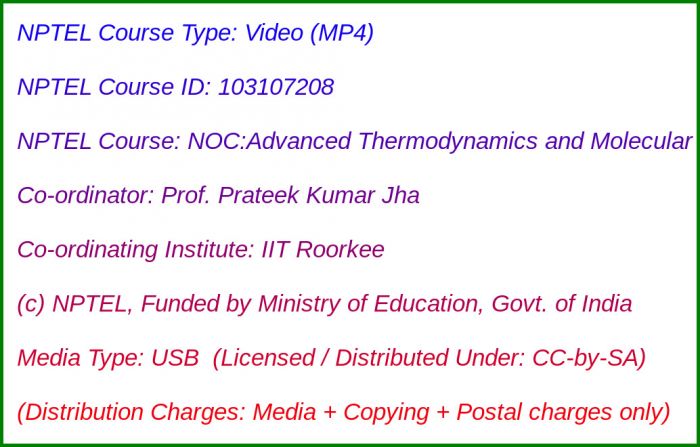NOC:Advanced Thermodynamics and Molecular Simulations

Media Storage Type : 32 GB USB Stick
NPTEL Subject Matter Expert : Prof. Prateek Kumar Jha
NPTEL Co-ordinating Institute : IIT Roorkee
NPTEL Lecture Count : 60
NPTEL Course Size : 12 GB
NPTEL PDF Text Transcription : Available and Included
NPTEL Subtitle Transcription : Available and Included (SRT)
Lecture Titles:
Lecture 1 - Introduction to the course
Lecture 2 - Molecular basis of energy and entropy
Lecture 3 - Probability and probability distributions
Lecture 4 - Probability distributions and thermodynamic equilibrium
Lecture 5 - Energy distribution in molecular systems
Lecture 6 - First and second law of thermodynamics
Lecture 7 - Reversible and irreversible processes; third law of thermodynamics; legendre transformation; thermodynamic functions for one component system
Lecture 8 - Thermodynamic functions for multi-component systems; chemical potential; why do we minimize thermodynamic functions?
Lecture 9 - Extensive and intensive variables; gibbs duhem relation; euler theorem; maxwell relations
Lecture 10 - Discrete and continuous probabilities; stirling approximation
Lecture 11 - Binomial distribution approaches Gaussian distribution for large n; definition of drunkard walk
Lecture 12 - Solution of drunkard walk; Lagrange multipliers
Lecture 13 - Energy distribution in molecular system revisited; introduction to thermodynamic ensembles
Lecture 14 - Canonical ensemble: most probable distribution, partition function
Lecture 15 - Definition of temperature; third law of thermodynamics
Lecture 16 - Canonical ensemble: Helmholtz free energy, averages and fluctuations, specific heat, deriving ideal gas law
Lecture 17 - Partition function of a dense gas; grand canonical ensemble: partition function, most probable distribution
Lecture 18 - Computing properties in grand canonical ensemble
Lecture 19 - Isothermal isobaric ensemble
Lecture 20 - Summary of thermodynamic ensembles; partition function of an ideal gas
Lecture 21 - Mixing and phase separation, phase equilibrium of a multiphase multicomponent system, Gibbs phase rule
Lecture 22 - Pure component phase diagram; solution thermodynamics: Helmholtz free energy density
Lecture 23 - Characterizing mixing and phase separation using Helmholtz free energy density
Lecture 24 - Common tangent construction, definition of binodal, spinodal, and critical point
Lecture 25 - Osmotic pressure and chemical potential
Lecture 26 - Lattice model of liquid solutions - I
Lecture 27 - Lattice model of liquid solutions - II
Lecture 28 - Lattice model of liquid solutions - III
Lecture 29 - Critical review of Lattice model, theoretical basis of molecular dynamics simulation
Lecture 30 - Theoretical basis of molecular dynamics simulation
Lecture 31 - Interaction energy and force field
Lecture 32 - Liouiville theorem; theoretical basis of Monte Carlo simulation
Lecture 33 - Introduction to Monte Carlo simulation method
Lecture 34 - Markov chain algorithm, condition for equilibrium and detailed balance
Lecture 35 - Metropolis algorithm, periodic boundary condition
Lecture 36 - Numerical implementation of Monte Carlo simulation: Python Examples - I
Lecture 37 - Numerical implementation of Monte Carlo simulation: Python Examples - II
Lecture 38 - Numerical implementation of Monte Carlo simulation: Python Examples - III
Lecture 39 - Numerical implementation of Monte Carlo simulation: Python Examples - IV
Lecture 40 - Numerical implementation of Monte Carlo simulation: Python Examples - V
Lecture 41 - Particle simulations: comparison with quantum chemical and continuum simulations; bridging length and time scales
Lecture 42 - Pair potentials
Lecture 43 - Saving CPU time: short range and long range interactions
Lecture 44 - Bonded and non-bonded interactions, force fields
Lecture 45 - Practical aspects of molecular simulations
Lecture 46 - Numerical implementation of MD; thermostat and barostat
Lecture 47 - MD simulations - efficiency and parallelization, sampling and averaging, analysis of simulation trajectories
Lecture 48 - MD simulations - analysis of simulation trajectories (continued), Case Studies - I
Lecture 49 - MD simulations - Case Studies - II
Lecture 50 - MD simulations - Case Studies - III
Lecture 51 - Free energies and phase behavior; extension of canonical ensemble Monte Carlo to other ensembles
Lecture 52 - Extension of canonical ensemble Monte Carlo to other ensembles (Continued...)
Lecture 53 - Monte Carlo in Gibbs ensemble and semi-grand canonical ensemble, thermodynamic integration
Lecture 54 - Thermodynamic integration (continued); Widom's particle insertion; overlapping distribution method
Lecture 55 - Multiple histogram method; umbrella sampling; thermodynamic cycle; potential of mean force; pulling simulations; metadynamics; tackling time scale issues
Lecture 56 - Tackling time scale issues (continued); nonequilibrium molecular dynamics; mesoscale simulations: Langevin dynamics and Brownian dynamics, kinetic Monte Carlo simulations; dissipative particle dynamics
Lecture 57 - Multiparticle collision dynamics; lattice Boltzmann method; coarse-graining
Lecture 58 - Case studies
Lecture 59 - Simulations of chemical reactions using Kinetic Monte Carlo simulations
Lecture 60 - Reactive force fields; Ab initio molecular dynamics and other advanced methods; molecular simulations in chemical engineering; concluding remarks

